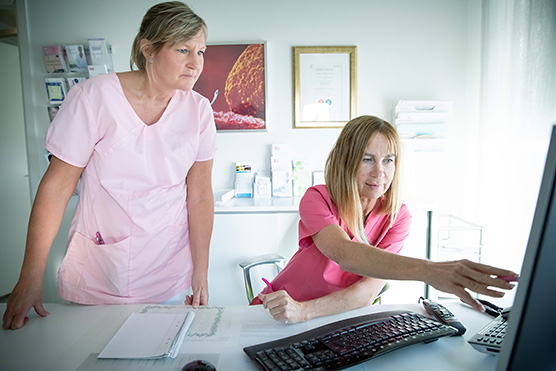Infertility investigation
In approximately 25% of couples, conceiving may take longer than a year of unprotected intercourse. After a year has elapsed, it’s advisable to initiate an infertility evaluation. However, if there are irregular or absent menstrual cycles, you can schedule an appointment after 3-4 months. It is crucial not to delay the infertility assessment, considering that fertility declines with age, particularly in women. For women aged 35 or older, investigations can commence after 6 months. For single women and same-sex female couples, the evaluation can begin as soon as there is a deliberate desire to conceive.
Evaluation of Opposite-Sex Couples
Both partners undergo the evaluation simultaneously. During the initial visit, you will meet with a doctor to review the health declarations you have both completed beforehand. This comprehensive understanding is crucial before commencing the investigation. If you have previously undergone infertility assessments at another clinic, please bring copies of the records. A transvaginal ultrasound will be conducted during the first visit to assess ovulatory function and egg reserve. Additionally, hormone tests, including the assessment of the “egg reserve” and screenings for thyroid disorders, will be carried out. The “egg reserve” indicates the quantity of immature eggs remaining in the ovaries.
For men, two semen samples are provided (at RMC, SUS, Malmö) to assess sperm quantity and quality. The sperm analysis is as vital as the tests for women. Typically, if the sperm analysis yields normal results, further investigation of the male factor is unnecessary.
The investigation usually takes 6-7 weeks.
Evaluation of Same-Sex Couples and Single Women
During the initial visit, a doctor will review your health declarations. The woman who will carry the child undergoes a transvaginal ultrasound. This evaluates ovulatory function and examines the fallopian tube passages. Hormone tests are conducted to rule out thyroid and pituitary gland disturbances. The anti-Müllerian hormone (AMH) level is checked to assess the “egg reserve”, providing an indication of the quantity of remaining eggs in the ovaries.
In Sweden, a psycho-social assessment by a behavioural scientist is mandatory for single women and couples before the treatment where donated gametes would be administered. This assessment focuses on the recipient’s overall capabilities, life situation, and social networks. Swedish legislation places a strong emphasis on children’s rights, ensuring they grow up in a secure and stable family environment.
The investigation usually takes 2-3 weeks.

What Comes Next?
At the final meeting the results of the evaluation are communicated in a personal meeting with the responsible doctor. The medical tests and laboratory results are discussed, providing information on prognosis and possibilities. Various treatment options will be presented, and you will have the opportunity to ask questions.
Would you like to schedule an appointment for your infertility concerns? Feel free to contact Limhamns kvinnoklinik for further details. Our wait time for a first visit is short.

